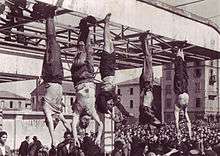Nicola Bombacci
| Nicola Bombacci | |
|---|---|
 | |
| Member of the Chamber of Deputies | |
|
In office 1 December 1919 – 25 January 1925 | |
| Personal details | |
| Born |
24 October 1879 Civitella di Romagna, Forlì, Italy |
| Died |
28 April 1945 (aged 65) Dongo, Como, Italy |
| Nationality | Italian |
| Political party |
Italian Socialist Party (1911–1921) Communist Party of Italy (1921–1927) Republican Fascist Party (1943–1945) |
| Spouse(s) | Erissene Focaccia (m. 1905–45); his death |
| Profession | Politician, journalist, revolutionary, labour unionist |
Nicola Bombacci (24 October 1879 – 28 April 1945), born at Civitella di Romagna, was an Italian Marxist socialist who was a member of the Italian Socialist Party in the late 19th and early 20th centuries, and who later became an Italian Fascist.
Biography

Nicola Bombacci was born near Forlì on 24 October 1879.
During his adolescence he joined the Italian Socialist Party, of which he became suddenly a national leader at the head of the revolutionary wing, known as Massimalisti; other notable members of this far-left wing were Costantino Lazzari and Benito Mussolini. In 1919 Bombacci became the Secretary of the PSI and in the general election in the same year he led the socialists to their best result ever; the PSI won the election with 32.3% and became the first party by votes and seats. Anyway the following year Bombacci resigned as Secretary of the Socialist Party, due to some tensions with the right-wing of the party led by Filippo Turati.
In 1921 he became one of the founding fathers of the Italian Communist Party.[1] Bombacci was a friend of future Italian Fascist dictator Benito Mussolini. Later in life, although he was not an official card-carrying member of the Fascist Party, Bombacci tried to help Mussolini legitimize the Italian Social Republic and relegitimize Italian Fascism after Mussolini was ousted as Prime Minister of the Kingdom of Italy.[2]
In the La Verità journal in 1936, Bombacci confessed “his adhesion to Fascism but also to Communism,” writing: “Fascism has made grandiose Social Revolution, Mussolini and Lenin, Soviet and Fascist corporate state, Rome and Moscow. Several stands already taken had to be rectified, we have nothing of which to ask pardon for as both in present and past we are impelled by the same ideal: the triumph of work.” [3] [4]
He was the author of the economic theory of socialization in 1943.
Nicknamed “the Red Pope”, Bombacci told a crowd in Genoa in 1945 that “Stalin will never make socialism; rather Mussolini will.” [5]
Bombacci was shot on 28 April 1945 at Dongo (province of Como) where he had been captured along with Mussolini by Italian communist partisans. He was summarily shot alongside Mussolini. Before his execution, Bombacci shouted out “Long live Mussolini! Long live socialism!”[6] After his death, he was hung upside down at Piazzale Loreto in a public display, along with Mussolini, Clara Petacci, the head of the Republican Fascist Party Alessandro Pavolini, and others.[7]
References
- ↑ Mack Smith, Denis (1994). Mussolini. London: Phoenix. p. 312. ISBN 1-85799-240-7.
- ↑ Smith, Denis Mack (1983). Vintage. p. 317. ISBN 0-394-71658-2. Missing or empty
|title=(help) - ↑ Norling, Erik (2011), Revolutionary Fascism, Lisbon, Portugal: Finis Mundi Press, p. 30
- ↑ Petacco, Arrigo (1996), Il comunista in camicia nera: Nicola Bombacci tra Lenin e Mussolini, Milan, p. 115
- ↑ Bosworth, R.J.B (2011), Mussolini, New York: Bloomsbury Academic, p. 511
- ↑ Muravchik, Joshua (2002), Heaven on Earth: The Rise and Fall of Socialism, New York: Encounter Books, p. 171
- ↑ Steve Cole (August 5, 2009). "The Execution of Mussolini".